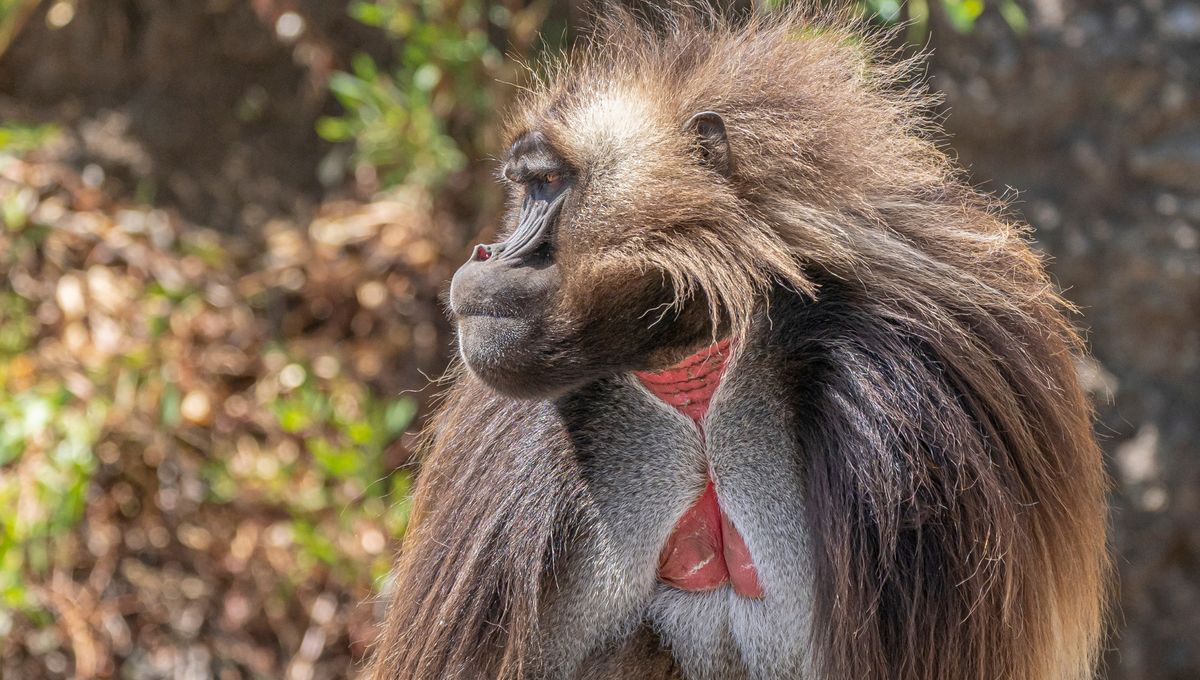
Female geladas, an African baboon, will pretend to be fertile and have sex with males to prevent attacks on their young. The deception is not just behavioral – the mothers experience estrogen surges that change their bodies to make the males think they are ready to bear new young. There is an energy price to pay for the change in appearance, but it’s worth it to save their babies.
Many animals display behaviors we would consider evil if conducted by a human, and infanticide is about as bad as it gets. Infanticide can occur for different reasons, such as when there isn’t enough food for all, but perhaps the most repulsive to us is when a new male takes over a pack and kills his predecessor’s offspring.
Unpleasant as it is to learn that gelada (Theropithecus gelada) usurpers engage in this ruthless behavior, it’s encouraging to know that evolution has also provided a partial antidote, although one with its own unpleasant side.
Like gorillas and some other primates, geladas live in packs with a single adult male and a harem of up to 12 females. Naturally, offspring too young to fend for themselves are also part of this pack, and the many males without females to mate with are always keen to overthrow the dominant male.
When a change of male occurs, it can be bad news for the predecessor’s offspring. Lactating females have little to no chance of conceiving, so the new male will sometimes kill babies, causing the mother’s milk to stop and making her fertile again sooner.
Primatologists have been studying wild geladas in the Simien Mountains National Park for years, and unsurprisingly have observed that females will do a lot to save their babies. For one thing, gelada mothers are so attached to their young that, like other baboons, they will carry them for days after death to grieve.
From an evolutionary perspective it also makes far more sense to want to raise the young that have already survived many dangers than to start over with a new male, who might be overthrown in turn.
An obvious path to do that is to convince the male that you’ll soon be ready to mate, so there is no need to get murderous.
Even 40 years ago, researchers reported increased “sexual swelling”, the way geladas advertise fertility, in female geladas after a new male took over their pack, but they had two explanations. The accelerated weaning hypothesis proposed that, aware of the danger, females would hurry their young to survive without milk so they could stop lactating and be ready to mate soon. The deceptive fertility hypothesis held that females dupe males into believing this was happening, so they could go on raising their young.
For decades, these two hypotheses have sat untested, but that has now changed. Fourteen years of observations have resulted in what researchers consider a decisive win for the deceptive fertility hypothesis. Females who were still lactating would show signs of fertility, but the space between conceptions would not be any shorter than if the takeover had not occurred.
Notably, this was not because the apparent fertility was unconvincing to the male. He was just as likely to copulate with the females who were faking it as with females who really were fertile, but offspring didn’t come until the female had not only weaned their baby, but had time to recover. Even the fact that females were often obviously lactating to the researchers didn’t make the males suspicious as long as they got their ends away.
There were some signs of accelerated weaning among the youngest infants (less than 6 months old) at the time of takeover, but none among the majority of those potentially at risk.
Not all geladas engage in deceptive swelling, allowing the researchers to see whether the strategy works. They found that it did. Although cause of death was not always obvious, infants whose mothers did not start sexual swelling soon after a takeover were much more likely to die within the first year than those whose mothers did.
Intriguingly, few baby geladas died soon after takeover, irrespective of the mothers’ response. Things really got dangerous around the 4-month mark for those whose mother did not display sexual swelling by that point.
Combined with the fact that the new males were so easily deceived, this suggests infanticide may not be as much of an evolutionary benefit as it might appear. Presumably some males in geladan history have gone on a Herod-like rampage, killing all the young of their new troop. Others have probably evolved the capacity to work out when females are faking their fertility, or were just naturally suspicious.
If either of these approaches provided a sufficiently powerful evolutionary advantage, they would now be widespread. Instead, the majority of gelada mothers showed signs of fertility, and 80 percent of their children were still alive a year later.
On the other hand, if there was no price to pay for the deception, presumably almost all the gelada mothers would do it. The extra estrogen production required to produce the swelling comes at an energetic cost, and there must also be a price to pay for letting the new male mate with them when not aroused.
The researchers argue that several features of gelada fertility make them ideal subjects for studying the phenomenon, but that the conclusions are probably applicable to some other primates with similar social structures.
The study is published in Current Biology.
Source Link: Gelada Mothers Fake Fertility To Save Their Babies From Infanticidal Males